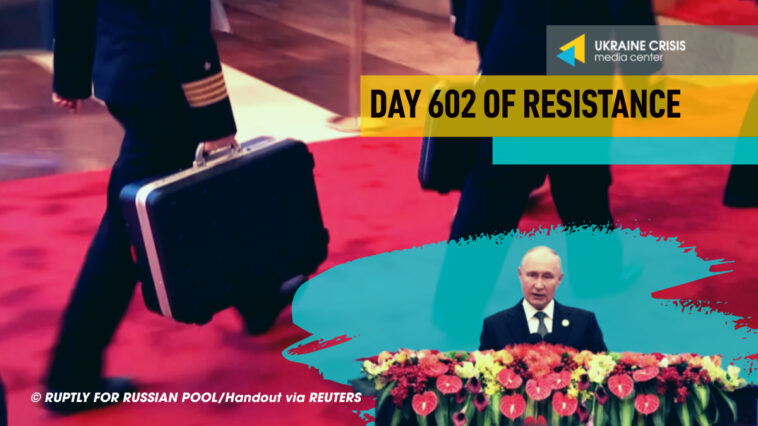Putin seen in China accompanied by the nuclear briefcase. Russian missile strikes on Zaporizhzhia and Dnipropetrovska regions kill six. Ukraine’s Security Service launches drone attack on military camp in Russia’s Kursk region.
Putin seen in China accompanied by nuclear briefcase
Russian President Vladimir Putin arrived in Beijing on Tuesday and met with Chinese leader Xi Jinping on Wednesday. He also attended the Belt and Road Forum in Beijing, alongside the leaders of Vietnam, Thailand, Mongolia and Laos. Both Putin and Xi avoided making explicit references to the Israel-Hamas war and Russia’s war against Ukraine.
Later, Putin said he talked for three hours with Xi, and that they discussed issues including Ukraine and the Middle East.
The Chinese leader, Xi Jinping, has welcomed his “dear friend” Vladimir Putin to Beijing, kicking off a multilateral summit. Xi lauded his Belt and Road Initiative presenting it as an alternative development model for the world and saying it “established a new framework for international cooperation.”
“The political mutual trust between the two countries is continuously deepening,” Xi said, praising “the close and effective strategic coordination” that the two countries have maintained.
Pictures show Vladimir Putin in Beijing accompanied by Russian officers carrying the so-called nuclear briefcase that can be used to order a nuclear strike. Russia’s nuclear briefcase, known as the “Cheget” after Mount Cheget in the Caucasus Mountains, is traditionally carried by a naval officer and is with the president at all times, but is rarely filmed or photographed.
Russian state-owned news agency RIA Novosti first posted the footage of Putin on its Telegram account for Kremlin pool journalists, writing underneath the video: “There are certain suitcases without which no trip of Putin’s is complete.”
The briefcase is a communication tool that links the president to his military top brass and thence to rocket forces via the highly secret “Kazbek” electronic command-and-control network. Caucasian names are used as code names in the nuclear sector.
Russian missile strikes on Zaporizhzhia, Dnipropetrovska regions kill six
Overnight on October 18, Russia launched six S-300 missiles at Zaporizhzhia, killing five people and injuring five others.
The strike damaged around 30 apartment buildings, smashing windows. Also, 11 private houses, two educational and two healthcare facilities were damaged, the city authorities said, adding that they continue to inspect the buildings.
Residents of a heavily damaged building were evacuated. They were warmed and offered psychological support, the message reads.
Russia launched another missile strike on Wednesday, damaging private houses in the town of Obukhivka in Dnipropetrovska region, killing one person, and injuring four others.
Ukraine’s Security Service launches drone attack on military camp in Russia’s Kursk region
Ukraine’s Security Service carried out a drone strike on a Russian military camp near the Khalino airfield in Russia’s Kursk region overnight on October 18, a source in the service told Ukrainska Pravda.
There were up to three thousand troops and around 80 pieces of military equipment deployed in the camp near the village of Postoyalye Dvory.
Drones hit at least 18 targets in the camp. The number of Russian losses is being clarified, the source said.
Community-based strategies for economic development. Ukraine in Flames #521
February 24, 2022 became a turning point for the development of the Ukrainian state. The war reshaped the landscape for territorial communities and presented fresh challenges for local self-government bodies. In the daily work of communities addressing immediate life support issues, there is a pressing need to mobilize and refocus efforts on fostering local economic growth. Watch Ukraine in flames #521 to find out about community strategies for local economic recovery and development, the USAID DOBRE Program’s methods, and current challenges in community economic recovery.
Guests:
- Nataliya Hnydiuk, Advisor to the Minister for Communities, Territories and Infrastructure Development of Ukraine
- Brian Kemple, Head of the USAID DOBRE Program
- Marat Kyurchevsky, Head of Programs for the Development of Local Self-Government and Decentralization of Power of the United States Agency (USAID)




